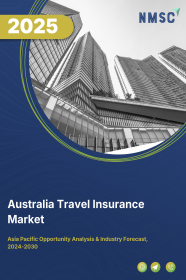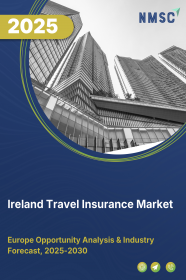
Australia Travel Insurance Market by Age (Millennials, Generation X, and Baby Boomers), by Income Level (Low-income travelers, Middle-income travelers and High-Income Travelers), by Coverage (Medical Coverage, Trip Cancellation Coverage, Baggage and Personal Belongings Coverage, Accidental Death and Dismemberment (AD&D) Coverage)– Opportunity Analysis and Industry Forecast, 2024–2030
Industry: BFSI | Publish Date: 14-Feb-2025 | No of Pages: 123 | No. of Tables: 90 | No. of Figures: 55 | Format: PDF | Report Code : BF1990
Market Overview
The Australia Travel Insurance Market size was valued at USD 154.7 million in 2023 and is predicted to reach USD 622.7 million by 2030, with a CAGR of 20.6 % from 2024 to 2030. Travel insurance is a specialized insurance product designed to offer protection and coverage to travelers against a wide range of potential risks and unforeseen circumstances that may occur before or during their journeys. It serves as a crucial tool in mitigating the financial impact of various travel-related emergencies, disruptions, and inconveniences, providing travelers with peace of mind and security throughout their trips. One of its primary advantages is its ability to provide financial reimbursement and assistance in the event of trip cancellations or interruptions. This coverage extends to unforeseen circumstances such as illness, injury, or emergencies, allowing travelers to recover non-refundable expenses incurred for flights, accommodations, and other pre-paid arrangements.
The Growing Number of Online Platforms for Travel Insurance Drives the Australia Industry
The expansion of online platforms specializing in travel insurance has fundamentally changed the dynamics of the travel insurance industry in the country, enhancing accessibility and convenience for consumers. These platforms provide a diverse range of options, empowering travelers to effortlessly compare policies and select the most appropriate one based on their preferences and financial circumstances.
Additionally, the online availability of these platforms simplifies the purchasing process, eliminating the need for cumbersome paperwork or visits to insurance providers in person. Consequently, the growing ubiquity of online platforms has heightened competition within the industry, prompting insurance companies to innovate and offer more competitive rates and comprehensive coverage options to capture customers in the digital domain.
Evolving Travel Landscape Boost the Australia Market Growth
The travel industry in the country is constantly evolving as consumer preferences, travel habits, and global trends change over time. This transformation can be seen in the emergence of new destinations and innovative travel styles tailored to diverse interests and preferences. As travelers increasingly seek unique experiences and veer off the beaten path, they encounter a spectrum of new risks and challenges, from medical emergencies in remote locations to cancellations stemming from unforeseen circumstances. In response to these changing needs, travel insurance providers are adapting and developing new insurance plans tailored to meet the specific requirements of modern travelers. These providers may introduce specialized coverage for adventure activities, extended travel periods, or the lifestyle of digital nomads.
By offering insurance options that align with emerging travel trends and destinations, insurers attract a broader clientele and extend their market presence. This proactive approach not only addresses the evolving demands of travelers but also fuels market expansion by providing comprehensive solutions that offer peace of mind and protection across a wide range of travel experiences. Ultimately, the symbiotic relationship between the evolving travel industry and innovative insurance offerings propels market growth and ensures that travelers have access to appropriate coverage for their diverse travel needs.
Perceived High Costs Associated with Travel Insurance Hinder the Australia Market Growth
The perceived high costs associated with travel insurance can serve as a significant hindrance to market expansion in the country. Many travelers may view insurance premiums as an extra financial burden, especially when compared to the overall expenses of their trip. This perception could lead individuals to opt out of purchasing coverage, particularly for shorter or less expensive trips, despite the potential financial risks involved. Moreover, the complexity of insurance pricing structures and the lack of transparency in coverage terms can intensify concerns about value for money. To tackle this challenge, insurance providers need to prioritize educating consumers about the benefits of travel insurance, highlighting its value in mitigating financial risks associated with unforeseen events during travel. Additionally, offering competitive pricing and flexible policies tailored to different travel needs can help alleviate concerns about cost and encourage broader adoption of travel insurance, thus driving market growth.
Predictive Analytics for Risk Assessment Creates Ample Opportunity for the Australia Market Growth
The integration of predictive analytics for risk assessment presents ample opportunities for market growth within the travel insurance industry in the country. By harnessing advanced algorithms and data analytics techniques, insurers can analyze vast amounts of historical and real-time data to accurately assess risks associated with travel, such as medical emergencies, trip cancellations, and natural disasters. This proactive approach enables insurers to offer more personalized and precisely tailored insurance products to customers, based on their unique travel profiles and risk factors.
Additionally, predictive analytics can enhance underwriting processes, enabling insurers to price policies more competitively and accurately while minimizing the likelihood of adverse selection. Furthermore, by leveraging predictive insights, insurers can develop proactive risk mitigation strategies and preventive measures, ultimately improving customer satisfaction and loyalty. Overall, the integration of predictive analytics for risk assessment creates a pathway for market growth by enhancing product innovation, customer experience, and operational efficiency within the travel insurance industry.
Competitive Landscape
Several market players operating in the Australia travel insurance market include Allianz Group, AXA SA, Zurich Insurance Group Limited, American International Group, Inc., Chubb Limited, Aviva PLC, Nationwide, Berkshire Hathaway Speciality Insurance, Travel Insured International, Generali Group and Others.
Australia Travel Insurance Market Key Segments
By Age
-
Millennials
-
Generation X
-
Baby Boomers
By Income Level
-
Low-income Travelers
-
Middle-income Travelers
-
High-income Travelers
By Coverage
-
Medical Coverage
-
Trip Cancellation Coverage
-
Baggage and Personal Belongings Coverage
-
Accidental Death and Dismemberment (AD&D) Coverage
By Days of Coverage
-
Short-Trip Insurance
-
Standard Trip Insurance
-
Extended Trip Insurance
-
Multi-Trip Insurance
By End User
-
Pilgrim Travelers
-
Education Travelers
-
Business Travelers
-
Family Travelers
By Distributional Channel
-
Insurance Companies
-
Banks
-
Airlines
-
Online Platforms
-
Insurance Aggregators and Comparison Websites
-
Travel Agents and Tour Operators
REPORT SCOPE AND SEGMENTATION:
|
Parameters |
Details |
|
Market Size in 2023 |
USD 154.7 Million |
|
Revenue Forecast in 2030 |
USD 622.7 Million |
|
Growth Rate |
CAGR of 20.6 % from 2024 to 2030 |
|
Analysis Period |
2023–2030 |
|
Base Year Considered |
2023 |
|
Forecast Period |
2024–2030 |
|
Market Size Estimation |
Million (USD) |
|
Growth Factors |
|
|
Companies Profiled |
10 |
|
Market Share |
Available for 10 companies |
|
Customization Scope |
Free customization (equivalent up to 80 working hours of analysts) after purchase. Addition or alteration to country, regional, and segment scope. |
|
Pricing and Purchase Options |
Avail customized purchase options to meet your exact research needs. |
KEY PLAYERS
-
Allianz Group
-
AXA SA
-
Zurich Insurance Group Limited
-
American International Group, Inc.
-
Chubb Limited
-
Aviva PLC
-
Nationwide
-
Berkshire Hathaway Speciality Insurance
-
Travel Insured International
-
Generali Group

















 Speak to Our Analyst
Speak to Our Analyst





















